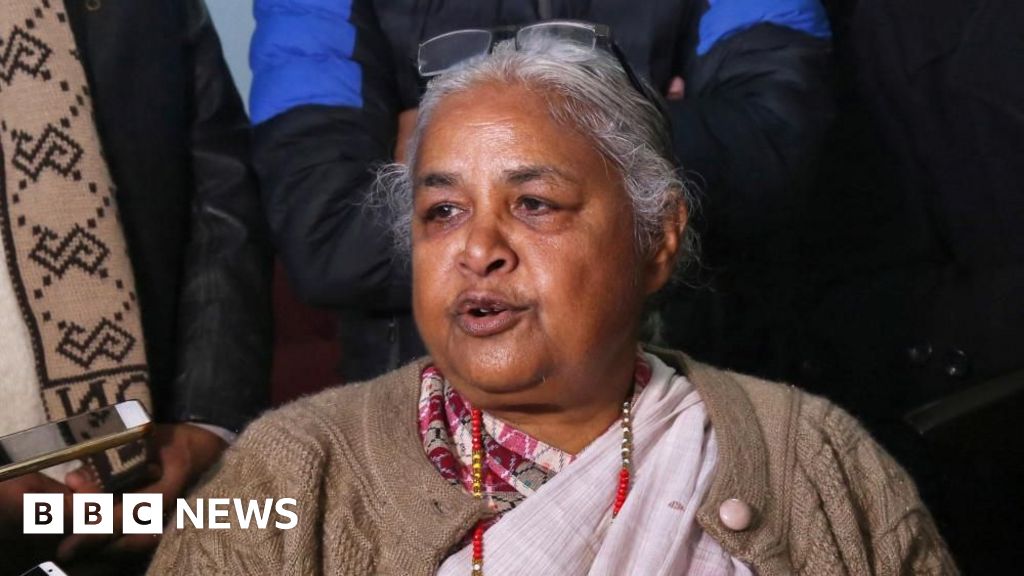Politics
Nepal Appoints First Female PM Amid Deadly Anti-Corruption Protests

Nepal is poised to welcome its first female prime minister, Sushila Karki, following a wave of deadly protests that led to the ousting of the previous government. Karki, who previously served as the Supreme Court’s chief justice, will assume the role of interim prime minister after a deal with protest leaders. This agreement follows a tumultuous week marked by widespread unrest and significant casualties.
The protests erupted after the government imposed a ban on 26 social media platforms, including popular sites like WhatsApp, Instagram, and Facebook. This decision ignited public outrage, culminating in clashes with riot police that left more than 50 people dead. As demonstrations escalated, angry crowds set fire to parliamentary buildings in Kathmandu, prompting Prime Minister KP Sharma Oli to resign on March 12, 2024.
Formation of Interim Government
Karki’s appointment signals a pivotal moment for Nepal, as she is set to take the oath of office on March 15, 2024. The announcement was confirmed by President Ram Chandra Poudel‘s press adviser, following extensive consultations with protest leaders and legal experts. The agreement reached indicates a potential dissolution of parliament in the near future, as the country seeks to stabilize after its worst unrest in decades.
Karki is widely viewed as a figure of integrity, supported by youth leaders from the “Gen Z” movement who demand accountability from the political elite. The protests were not solely a reaction to the social media ban; they also reflected a broader discontent with corruption and the lavish lifestyles of politicians’ children, highlighted by the recent “nepo kid” campaign that gained traction on social media.
Military Presence and Public Sentiment
In response to the escalating violence, the Nepal Army has deployed patrols throughout Kathmandu, aiming to maintain order in a city shaken by turmoil. The recent protests underscore a significant shift in public sentiment, as citizens demand transparency and reform from their leaders.
While the social media ban was lifted on March 11, 2024, the momentum of the protests was already unstoppable. The government’s decision to restrict access to these platforms was perceived as an attempt to silence dissent and suppress the growing calls for change.
As Nepal enters this new chapter under Karki’s leadership, the international community watches closely, hopeful for a peaceful resolution to the unrest and a commitment to addressing the issues that have sparked such widespread anger among the populace.
-

 Business5 months ago
Business5 months agoKenvue Dismisses CEO Thibaut Mongon as Strategic Review Advances
-

 Lifestyle4 months ago
Lifestyle4 months agoHumanism Camp Engages 250 Youths in Summer Fest 2025
-

 Sports4 months ago
Sports4 months agoDe Minaur Triumphs at Washington Open After Thrilling Comeback
-

 Sports5 months ago
Sports5 months agoTupou and Daugunu Join First Nations Squad for Lions Clash
-

 Top Stories5 months ago
Top Stories5 months agoColombian Senator Miguel Uribe Shows Signs of Recovery After Attack
-

 World5 months ago
World5 months agoASEAN Gears Up for Historic Joint Meeting of Foreign and Economic Ministers
-

 Health4 months ago
Health4 months agoNew Study Challenges Assumptions About Aging and Inflammation
-

 Business5 months ago
Business5 months agoOil Prices Surge Following New EU Sanctions on Russia
-

 Entertainment4 months ago
Entertainment4 months agoDetaşe-Sabah Violin Ensemble Captivates at Gabala Music Festival
-

 Entertainment4 months ago
Entertainment4 months agoBaku Metro Extends Hours for Justin Timberlake Concert
-

 Top Stories5 months ago
Top Stories5 months agoRethinking Singapore’s F&B Regulations Amid Business Closures
-

 Business5 months ago
Business5 months agoU.S. House Approves Stablecoin Bill, Sends to Trump for Signature









